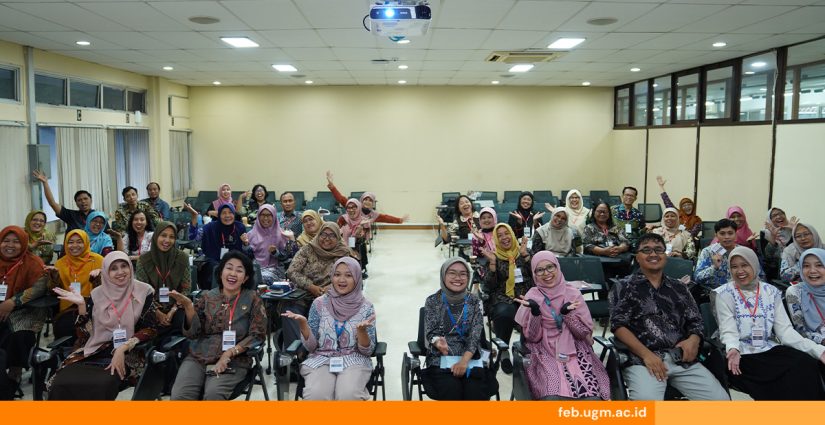
As the primary educators in schools, teachers play a vital role in guiding students through the learning process. Therefore, capacity building and the process of relearning are essential steps to support the improvement of students’ learning outcomes. As part of its community service initiative, the Microeconomics Dashboard Research Division of the Faculty of Economics and Business, Universitas Gadjah Mada (FEB UGM), organized the “Economics and Business Clinic: Capacity Building Training for High School Economics Teachers in the Special Region of Yogyakarta (DIY) 2025.” The event was held offline on the 3rd floor of the West Wing of FEB UGM on Thursday (22/05/2025).
The Microeconomics Dashboard Research Division Coordinator, Qisha Quarina, S.E., M.Sc., Ph.D., expressed her appreciation for the enthusiasm the participating teachers showed. “We hope this year’s APBD and APBN theme will enrich your knowledge and enhance your teaching capacity. We also hope the materials presented this year can continue to be developed and delivered in the coming years,” she stated in her opening remarks.
A representative from the Economics Subject Teachers Association (MGMP) of DIY, Suparji, S.E., M.Pd., also expressed his gratitude for the opportunity to continue learning together through this training. According to him, the APBD and the APBN are essential issues that must be constantly updated to reflect fiscal policies, which are continually evolving. “Since APBD and APBN are highly dynamic, it is important for teachers to stay informed about their development to remain relevant with the current realities. Hopefully, what we learn here can be passed on to our students at school,” he said.
Now in its third year, the 2025 training was successfully attended by 42 economics teachers across the Special Region of Yogyakarta. The training consisted of two sessions. The first session covered the topic of Regional Revenue and Expenditure Budget (APBD), presented by Amirullah Setya Hardi, S.E., Cand.Oecon., Ph.D., a lecturer from the Economics Program at FEB UGM. The second session focused on the State Revenue and Expenditure Budget (APBN), presented by another lecturer from the Economics Program, Akhmad Akbar Susamto, S.E., M.Phil., Ph.D.
This training aims to enhance the capacity of high school economics teachers throughout DIY (the Special Region of Yogyakarta) and enrich teaching materials, which in turn will directly contribute to better learning outcomes for students. This initiative aligns with FEB UGM’s commitment to the achievement of the 2030 Sustainable Development Goals (SDGs), Goal 4 (Quality Education), Goal 10 (Reduced Inequalities), and Goal 17 (Partnerships for the Goals).
Reportage: Najwah Ariella Puteri
Sustainable Development Goals









